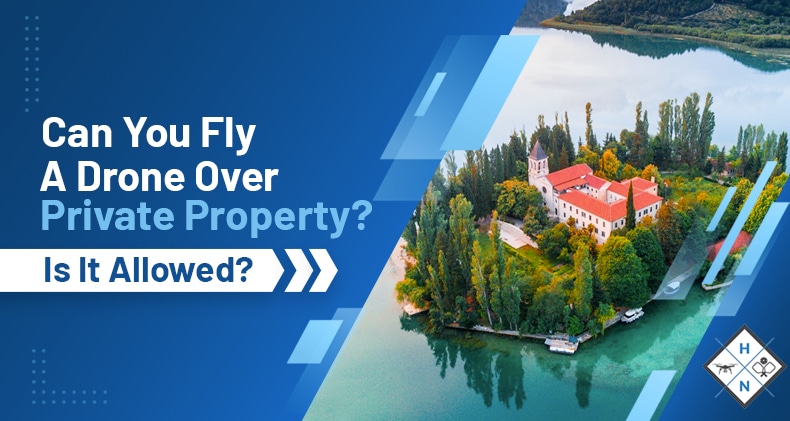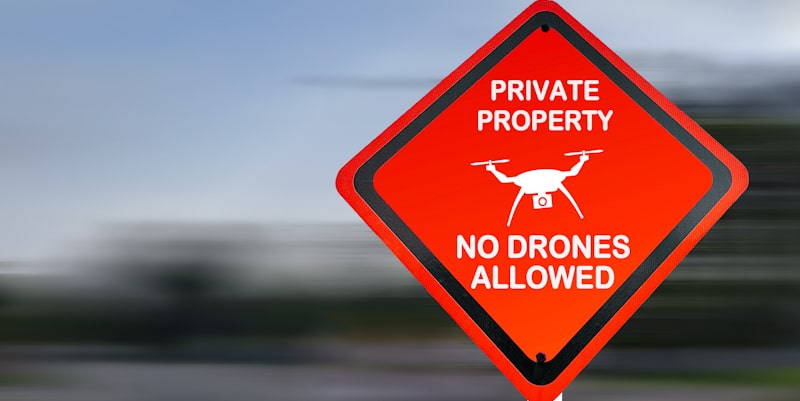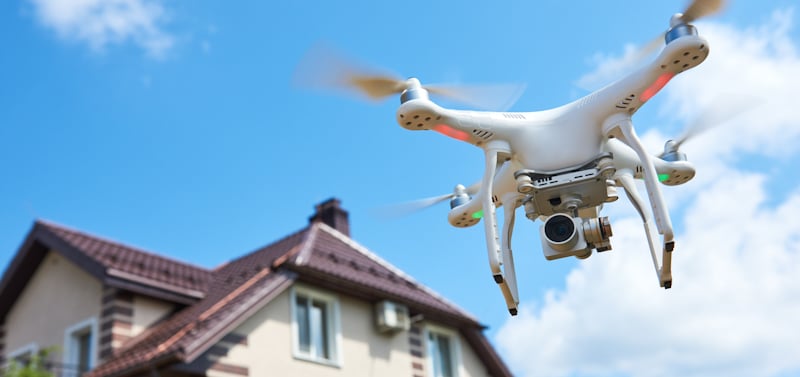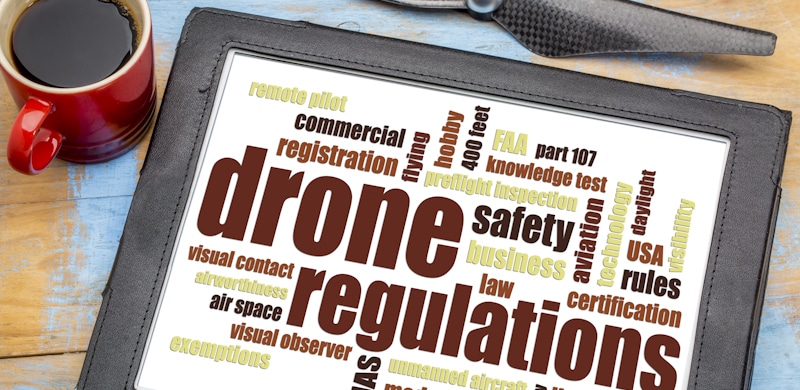You must be aware as a new drone pilot of the laws and regulations enforced in areas you intend to fly your drone. This is important because what is not considered an offense in an area could be in another. Ignorance is no excuse to break the law, they say.
Yes, you can fly a drone over private property, The Federal Aviation Administration (FAA) only controls the airspace over 400 feet, so this means it is legal for drones to fly over private property. However, some states and areas passed laws that prohibit drones from flying over private property.
The simple answer to the question is yes, but you need to ensure you are not violating any local regulations and laws when you fly your drone. You need to understand things before venturing as a drone pilot, either for recreation or profession.
The Federal Aviation Administration (FAA) And The Airspace
The FAA or Federal Aviation Administration is the federal agency charged with the responsibility of regulating the airspace. The laws enforced by the Federal Aviation Administration are more superior and override every state and local law because it is a federal agency.
The airspace is separated into two categories, "Controlled Airspace" is the airspace above 400 feet from the ground, and "Uncontrolled Airspace" is the airspace 400 feet from the ground.
The FAA only regulates the controlled airspace, and drones are prohibited from entering or flying in controlled airspace. FAA laws do not prohibit drones from flying below 400 feet, but local and state laws can regulate the uncontrolled airspace.
Some of the FAA laws and regulations that guide recreational flying of drones are,
- You must maintain a visual line of sight with the drone.
- You must not use your drone for side jobs, only hobbies.
- Unless your drone has adequate lighting, do not fly it at night.
- You must register your drone with the FAA.
- Your drone must not weigh more than 55 pounds unless it is certified by a community-based organization.
- You must not fly your drone over moving vehicles or people.
- You must not fly near emergency response activities.
- You must not fly near or interfere with manned aircraft.
Although, there are plans underway by the FAA to expand the laws and regulations guiding the recreational flying of drones.
If you are flying drones commercially, you need to understand the Federal Aviation Administration rules.
- You need an FAA-issued Remote Pilot Certificate to fly commercially.
- You must fly at or under 100 mph.
- You can only fly your drone in Class G airspace.
- You must give way to manned aircraft.
- You must not fly from a moving vehicle, except you are in a sparsely populated location.
Can You Fly A Drone Over Private Property In California
As stated earlier, the Federal Aviation Administration does not regulate the airspace 400 feet from the ground, but different states and areas have their laws and regulations that control the airspace.
No, you cannot fly a drone over private property in California. Drone snooping is not specifically a crime. But in August 2015, the California State Assembly passed legislation that would make a drone pilot who flies his drone over private property guilty of trespassing.
California has enforced laws to regulate its uncontrolled airspace. Though the airspace laws and regulations enforced by the FAA override any laws enforced by any state.
Since 2015, there have been different bills proposed to ban drones' flying over private properties in California. AB-856, signed in 2015, makes a drone pilot who flies his drone in the airspace above another person's land without his consent guilty.
So, if you intend to fly your drone over private property in California, you need to request permission from the property owners, or you could be sued for privacy infringement.
There have been some laws regulating the flying of drones that have been enforced. We will look at the laws regulating drone flying that have been enforced.
- It is a crime against public health and safety to fly your drone at an emergency scene, especially if it interferes with first responders' activities.
- If your drone is destroyed or damaged by first responders at an emergency scene, it is your loss. You cannot do anything about it.
- It is illegal to fly a drone over the lands of correctional facilities; there is a fine of $500 for people found guilty.
- It is illegal to use a drone for pest control, except the pilot has a valid manned pest control aircraft pilot's certificate.
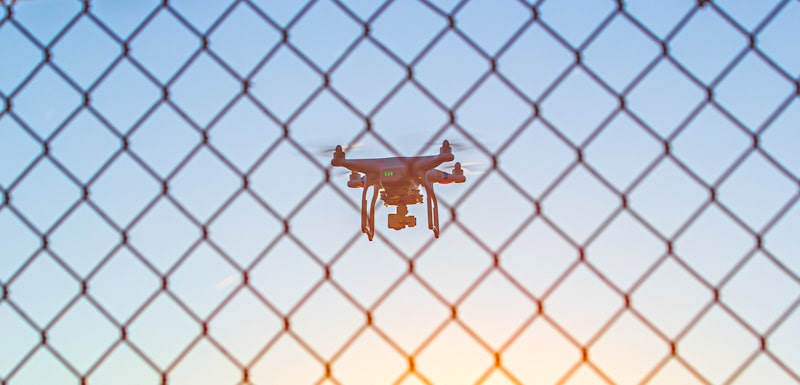
There are parks in California where there are restrictions on flying drones. The parks with restrictions on drone flights are.
- County parks in Sacramento County.
- City parks across San Francisco without the permission of the Recreation and Park Department.
- Areas operated by Santa Clara Valley Open Space Authority.
- Orange County Parks.
- Parks in La Mesa city.
- Parks owned or operated by the Mountains Recreation & Conservation Authority.
The National Park Service has prohibited the flying of drones in all Golden Gate National Parks across California.
California has its laws, and some laws apply to certain cities, regions, or counties within California.
- In the city of Malibu, it is prohibited to fly a drone. If you want to fly a drone for commercial reasons, you need a flying permit. This is because most of Malibu's airspace is under National Park airspace, a No-Fly Zone.
- To fly a drone in Los Angeles, you need to submit a Certificate of Insurance and Endorsement from your insurance broker.
- In the town of Los Alamitos, there are heavy restrictions on flying drones and other flight activities.
- There are restrictions on flying drones in the city of Hermosa Beach. You cannot fly a drone in any school's airspace, and you cannot pilot a drone anywhere in the city without obtaining an operating permit.
- In Yorba Linda city, drone takeoffs and landings that occur outside the pilot's visual line of sight, within 25 feet of another person, and on private property without the owner's permission are forbidden.
- The flying of drones is prohibited on or over any property managed by the MidPeninsula Regional Open Space District. You can fly a drone only in areas designated for that use.
While California State has its laws that regulate the use of drones, each state has its local laws and regulations.
Can You Fly A Drone Over Private Property In Texas
Texas is another state in the United States of America with laws and regulations guiding its airspace apart from the Federal Aviation Administration federal rules on airspace.
No, you cannot fly a drone over private property in Texas. It is prohibited to use drones to survey public infrastructure and private properties. However, there are some exceptions, only law enforcement officers, a professor researching, and an employee of an oil, gas, or power company.
The laws in Texas on the use of drones are one of the strictest in the US. And you can only use drones for academic, professional, military, municipal authorities, law enforcement research, and some emergency and safety purposes. Land surveyors and realtors can also use drones to market properties.
The laws that regulate the use of drones in Texas are
- The use of drones over detention and correctional facilities is prohibited. It is also prohibited to use drones over a sports center except on special occasions.
- It is permitted for certain professions to use drones to capture images as long as no person can be identified from the image.
- It is a Class B misdemeanor that attracts a $500 fine when you use a drone over a critical infrastructure facility when the drone is not more than 400 feet above the ground.
- It is illegal to use drones to capture images. Possessing and distributing the image is considered a Class B misdemeanor, and a defaulter will pay a fine of $2000 and is subject to 180 days in jail.
- It is unlawful to use drones to capture, hunt, take, drive, photograph, or count any wildlife except with a Land Owner Authorization (LOA) or an Aerial Management Permit (AMP).
- Drones are forbidden in Texas State Parks without a permit. However, there are two parks, San Angelo and Lake Whitney, where drones are flown.
As mentioned earlier, Texas has the strictest laws regulating the use of drones in the state, so you must learn all the laws on drone flight in Texas and the local laws in the city, town, or county you are in.
What to do When Someone Flies Their Drone Over Your Property
When you fly your drone over the top of someone else's home they have the right to file either a criminal or a civil complaint against you. What they can do will depend upon the laws and regulations regarding recreational drone flying in your community. If the state or local laws say that you aren't permitted to fly a drone in a residential area or over the top of private property, then the person is allowed to file a complaint against you for doing so. When this happens the local law enforcement personnel can fine you and possibly confiscate your drone depending on what laws you've violated.
Even if there aren't specific laws regarding the operation of drones in your local area it's still possible that someone can take some form of action against you. They can file a suit against you that alleges that you:
- Invaded their right to privacy
- Trespassed on their private property
- Created a nuisance
If someone files a civil lawsuit against you they will need to have physical evidence (e.g. photos, videos) that your drone has flown over the top of their private property. Of course, you'll also have your own evidence since you'll have GPS and flight data verifying the drone's flight path.
How to Stop Drones From Flying Over Your Property
There are a lot of drones that are equipped with cameras today. If a homeowner is able to demonstrate that your drone's camera has invaded their privacy they may have a case against you. There are currently 24 states in which this is currently the case.
When your drone invades another person's privacy you may have a temporary restraining order served against you. This means that you can't fly over the person's residence. They may say that you're trespassing as this is something that applies to both people and objects. For instance, if your neighbor's tree branch extends over the top of your property line you're legally allowed to trim it. In the same way, when a drone flies over the top of a homeowner's property boundaries they can say that it was trespassing. Unfortunately, there is no law regarding how much of the airspace above a person's home is considered to be within the property's boundary. This is why a court will require the person to provide photographic evidence that the drone flew near their home.
Another type of complaint you may have filed against you and your drone is for being a nuisance. Oftentimes someone will file this when the drone disrupts their quiet enjoyment of their property. If you're dealing with someone who's technically savvy they may also try to jam your drone's signal. This means that they're attempting to block the radio signal that's being sent between you and your drone. If this happens, your drone will either return to the location from which it took off or its present home location. Unfortunately, most people don't realize that using a jammer to intentionally interfere with a drone's radio communication is in direct violation of federal law.
Drone Recording in Backyards
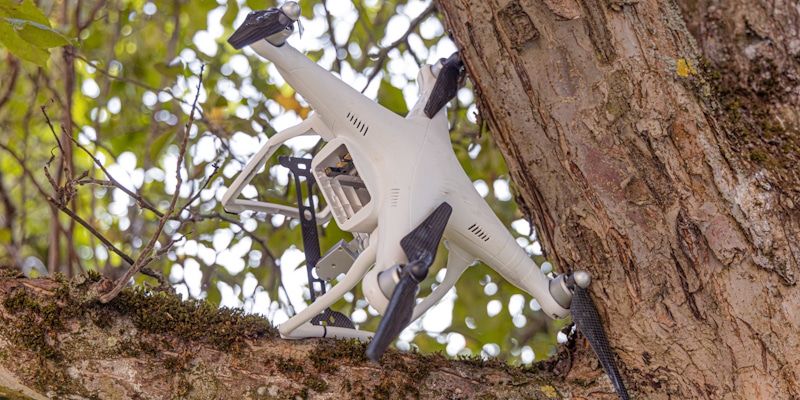
According to the law, property owners can't expect privacy when they're out in the open, even if they're in their own backyard. Therefore there really isn't anything you can do if a drone is there. You'll still need to go through legal channels to prevent the person from flying their drone there in the future. There are a few different types of cases that you can file here. They include:
Private Cause of Action for Private Nuisance
If you've made reasonable requests to your neighbor asking them to fly their drone elsewhere and they haven't responded favorably you may have a court cause of action that's known as a "private nuisance." In this case, the nuisance would be the noise that the drone is making (e.g. the whirring of the drone's engine and blades) and how this is preventing you from having the quiet enjoyment of your property. When you file such a lawsuit most people will stop their annoying actions.
Private Cause of Action for Trespass
It's also possible for you to make a legal case that the drone operator is trespassing on your property. However, it's important to remember that you don't necessarily own all of the air rights that are located above your property. In most states, you will be the owner of the immediate air rights that are surrounding your home's roof. Unfortunately, how high you own isn't an easy or unified answer as this will depend upon the state you're living in. By taking photographs of where the drone is flying you can show the court that the drone is getting dangerously close to your home. In this case, most judges will say that the drone operator is trespassing.
Private Cause of Action for Invasion of Privacy
One thing that a lot of people are concerned about with personal drones is that they may have a camera installed on them. These could be very powerful cameras that allow the drone's operator to snoop on you. This is something that many states are concerned about today. Regardless of whether you live in one of these states, if you believe that the drone operator has a camera on their drone you may have a cause of action regarding the invasion of your privacy. When you go to court you can ask for a temporary restraining order directing the drone's operator not to fly near you.
Limited Damages From Private Causes of Action
One of the challenges that you'll be faced with when you take a drone's operator to court for either trespassing or being a nuisance is that you probably won't be granted much money. This is because you will find it challenging to prove that you've suffered from a lot of financial harm. Therefore you're better off trying to resolve this issue with the drone operator without involving the court.
Final Thoughts
While you as a property owner do have the right to control some of the usable space that's located above your land, the FAA still has the right to regulate drone use both below and within navigable airspace. This is why some companies who want to deliver products to their customers via drones are having such a difficult time doing so today: They must pass over people's property and if the state prohibits this, calling it a form of trespassing, they won't be able to do so. The courts are in a difficult spot here because if they authorize the carrier to use the airspace for making deliveries they may need to require the company to compensate the property owner. Ultimately the FAA will allow you to fly your drone above private property.
Understanding the laws and regulations that guide any activity you want to engage in is essential. It is the only way you can act safely and lawfully.
Are you contemplating flying your drone over your neighbor's property, or you want to take some nice pictures of the aerial view? Then make sure to take this information we have provided to heart and stay updated on all drone regulations for your state.
Shawn Manaher loves to play with new toys and dive into new hobbies. As a serial entrepreneur, work definitely comes first but there is always room for hobbies.

